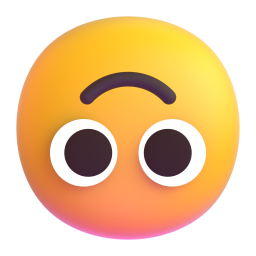🙃
🙃 Upside-Down Face
Also known as: Sarcasm, Silly
Unicode: U+1F643
Description
A classic smiley, turned upside down. Implemented as a flipped version of 🙂 Slightly Smiling Face on most platforms. Commonly used to convey irony, sarcasm, joking, or a sense of goofiness or silliness. Its intent can be similar to the bemused Oh well! of 🤷 Person Shrugging or the shruggie emoticon, ¯\_(ツ)_/¯. Microsoft's design previously featured a full-toothed grin.
Image Variants

3D
Color
Flat
High Contrast
Version Information
Emoji Version:1.0
Unicode Version:8.0
Keywords
faceupside-down
Shortcodes
| Platform | Shortcode | Action |
|---|---|---|
| Emojipedia | :upside_down_face: | |
| GitHub | :upside_down_face: | |
| Slack | :upside_down_face: | |
| Discord | :upside_down: | |
| Discord | :upside_down_face: |
Additional Information
Category:Emoticons -> Faces
Definition:
A face that is upside-down, often representing a sense silliness or goofiness. Sometimes used as an ambiguous emotion, such as joking or sar http://emojipedia.org/upside-down-face/
Adjectives:
- Being in such a position that top and bottom are reversed
- Foolish, silly
- Ludicrous, foolish
Verbs:
- Change one's facial expression by spreading the lips, often to signal pleasure
Nouns:
- Part of the body at the front of the head
- The face is a central organ of sense and is also very central in the expression of emotion among humans and among numerous other species.
- Faces are the central sense organ complexes, for those animals that have one, normally on the ventral surface of the head.
- The front of the human head from the forehead to the chin and ear to ear
- The front part of the head, featuring the eyes, nose, and mouth and the surrounding area.
- A happy face expression using mouth, but without producing voice.
- A smile is a facial expression formed by flexing the muscles near both ends of the mouth and by flexing muscles throughout the mouth.
- A facial expression comprised by flexing the muscles of both ends of one's mouth, often showing the front teeth, without vocalisation, and in humans is a common involuntary or voluntary expression of happiness, pleasure, amusement or anxiety.
- A facial expression characterized by turning up the corners of the mouth; usually shows pleasure or amusement
- Conscious or subconscious facial muscular movement conveying mirth or pleasure
- An upwards movement of the sides of the mouth that indicates happiness or satisfaction.

